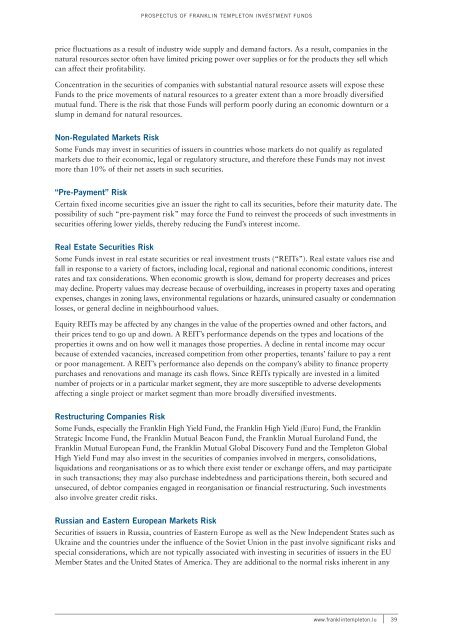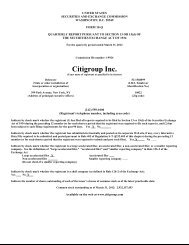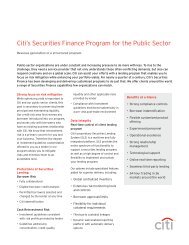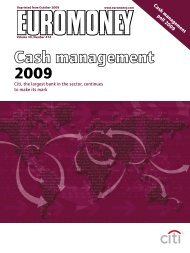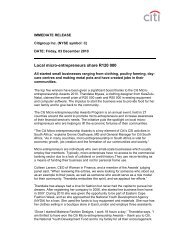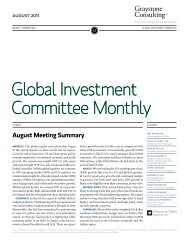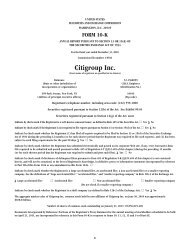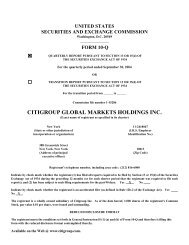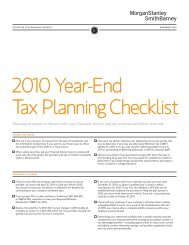FRANkLiN TEMPLETON INVESTMENT FUNDS - Citibank
FRANkLiN TEMPLETON INVESTMENT FUNDS - Citibank
FRANkLiN TEMPLETON INVESTMENT FUNDS - Citibank
You also want an ePaper? Increase the reach of your titles
YUMPU automatically turns print PDFs into web optimized ePapers that Google loves.
PROSPECTUS OF FRANKLIN <strong>TEMPLETON</strong> <strong>INVESTMENT</strong> <strong>FUNDS</strong><br />
price fluctuations as a result of industry wide supply and demand factors. As a result, companies in the<br />
natural resources sector often have limited pricing power over supplies or for the products they sell which<br />
can affect their profitability.<br />
Concentration in the securities of companies with substantial natural resource assets will expose these<br />
Funds to the price movements of natural resources to a greater extent than a more broadly diversified<br />
mutual fund. There is the risk that those Funds will perform poorly during an economic downturn or a<br />
slump in demand for natural resources.<br />
Non- Regulated Markets Risk<br />
Some Funds may invest in securities of issuers in countries whose markets do not qualify as regulated<br />
markets due to their economic, legal or regulatory structure, and therefore these Funds may not invest<br />
more than 10% of their net assets in such securities.<br />
“ Pre- Payment” Risk<br />
Certain fixed income securities give an issuer the right to call its securities, before their maturity date. The<br />
possibility of such “ pre- payment risk” may force the Fund to reinvest the proceeds of such investments in<br />
securities offering lower yields, thereby reducing the Fund’s interest income.<br />
Real Estate Securities Risk<br />
Some Funds invest in real estate securities or real investment trusts (“REITs”). Real estate values rise and<br />
fall in response to a variety of factors, including local, regional and national economic conditions, interest<br />
rates and tax considerations. When economic growth is slow, demand for property decreases and prices<br />
may decline. Property values may decrease because of overbuilding, increases in property taxes and operating<br />
expenses, changes in zoning laws, environmental regulations or hazards, uninsured casualty or condemnation<br />
losses, or general decline in neighbourhood values.<br />
Equity REITs may be affected by any changes in the value of the properties owned and other factors, and<br />
their prices tend to go up and down. A REIT’s performance depends on the types and locations of the<br />
properties it owns and on how well it manages those properties. A decline in rental income may occur<br />
because of extended vacancies, increased competition from other properties, tenants’ failure to pay a rent<br />
or poor management. A REIT’s performance also depends on the company’s ability to finance property<br />
purchases and renovations and manage its cash flows. Since REITs typically are invested in a limited<br />
number of projects or in a particular market segment, they are more susceptible to adverse developments<br />
affecting a single project or market segment than more broadly diversified investments.<br />
Restructuring Companies Risk<br />
Some Funds, especially the Franklin High Yield Fund, the Franklin High Yield (Euro) Fund, the Franklin<br />
Strategic Income Fund, the Franklin Mutual Beacon Fund, the Franklin Mutual Euroland Fund, the<br />
Franklin Mutual European Fund, the Franklin Mutual Global Discovery Fund and the Templeton Global<br />
High Yield Fund may also invest in the securities of companies involved in mergers, consolidations,<br />
liquidations and reorganisations or as to which there exist tender or exchange offers, and may participate<br />
in such transactions; they may also purchase indebtedness and participations therein, both secured and<br />
unsecured, of debtor companies engaged in reorganisation or financial restructuring. Such investments<br />
also involve greater credit risks.<br />
Russian and Eastern European Markets Risk<br />
Securities of issuers in Russia, countries of Eastern Europe as well as the New Independent States such as<br />
Ukraine and the countries under the influence of the Soviet Union in the past involve significant risks and<br />
special considerations, which are not typically associated with investing in securities of issuers in the EU<br />
Member States and the United States of America. They are additional to the normal risks inherent in any<br />
www.franklintempleton.lu 39


